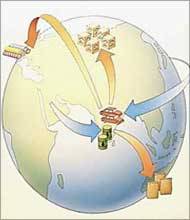The Central Board of Excise and Customs has put in place a comprehensive mechanism for verification and monitoring of exports made under various duty exemption or reward schemes.
 The Foreign Trade Policy has outlined various trade promotion schemes for exporters and importers like advance authorisation, duty-free import authorisation, as well as the export promotion capital goods scheme.
The Foreign Trade Policy has outlined various trade promotion schemes for exporters and importers like advance authorisation, duty-free import authorisation, as well as the export promotion capital goods scheme.
In advance authorisation and duty-free imports, the customs department gives a certificate to an exporter to import freely certain amount equivalent to the amount of exports, and goods related to its exports done.
Sometimes this credit given prior to the exports is done and, thus, it is called advance authorisation. These certificates are called duty credit scrips.
The decision to set up a centralised monitoring mechanism over and above the monitoring procedures under different port jurisdictions follows reports received from the field formations, which indicated discrepancies during the verification of the duty credit scrips, officials said. Officials also added that such discrepancies have huge revenue implications. Following such reports, the board has also examined all trade promotion schemes under the Foreign Trade Policy.
For trade benefits for export of capital goods under EPCG, the Customs authorities at the relevant port have been directed to check the installation certificate within six months of completion of imports. The authorities will also ensure fulfilment of 50 per cent of export obligation under this scheme in the first phase before awarding export credits. Under EPGC, exports get trade benefits for importing goods necessary for exports of capital goods. In revenue terms, these benefits run into huge sum since it involves capital goods, explained officials.
Installation certificate involves clearance that the importer has already installed necessary machinery in India which it has imported and which is required for manufacturing goods meant for exports. The Customs authorities have been directed to conduct random verification of benefits under EPCG/DFIA/advance authorisation schemes. The notification issued by the board states that this is required since EPCG requires installation of the capital goods and the Advance Authorisation scheme (and DFIA scheme in some cases) contemplates actual usage of the imported goods.
The department has also been asked to verify the genuineness of scrips or certificates of duty credit before allowing registration of such scrips. For this purpose, random verification of the shipping bills based on which the said duty credit scrip has been issued shall be checked to ascertain the genuineness of such shipping bills. For every export, the exporter gets certificate for duty-free import of export-related goods. The shipping bills relate to such exports, explained an official.
A quarterly report on the outcome of the said verification will be forwarded to the Board, which should include details of the discrepancies noticed during the verification and the measures taken to redress such discrepancies.
In case of default of export obligation under these schemes, an importer/exporter should pay proportional duty of unfulfilled portion of export obligation along with interest from the date of clearance of goods. Such payments should be paid within three months from the expiry of duty payment date.









